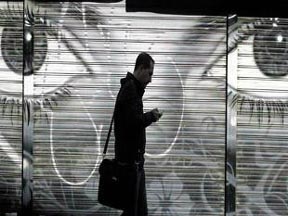 WASHINGTON: America’s secretive National Security Agency is collecting nearly five billion cell phone records a day about the precise locations of individuals, including non-US citizens, a media report said today.
WASHINGTON: America’s secretive National Security Agency is collecting nearly five billion cell phone records a day about the precise locations of individuals, including non-US citizens, a media report said today.
The startling revelations by The Washington Post are based on the classified documents leaked by Edward Snowden, a former CIA contractor who is currently on an asylum in Russia.
According to the daily, the NSA does not target Americans’ location data by design, but the agency acquires a substantial amount of information on the whereabouts of domestic cellphones “incidentally”, a legal term that connotes a foreseeable but not deliberate result.
One senior collection manager, speaking on the condition of anonymity but with permission from the NSA, told The Post “we are getting vast volumes” of location data from around the world by tapping into the cables that connect mobile networks globally and that serve US cellphones as well as foreign ones.
Additionally, data are often collected from the tens of millions of Americans who travel abroad with their cellphones every year, the official said.
US officials said the programs that collect and analyze location data are lawful and intended strictly to develop intelligence about foreign targets, the daily reported.
According to Robert Litt, general counsel for the Office of the Director of National Intelligence, which oversees the NSA, “there is no element of the intelligence community that under any authority is intentionally collecting bulk cellphone location information about cellphones in the United States.”
Noting that the NSA has no reason to suspect that the movements of the overwhelming majority of cellphone users would be relevant to national security, the daily said the agency collects locations in bulk because its most powerful analytic tools – known collectively as “co-traveler” allow it to look for unknown associates of known intelligence targets by tracking people whose movements intersect.
“Still, location data, especially when aggregated over time, are widely regarded among privacy advocates as uniquely sensitive. Sophisticated mathematical techniques enable NSA analysts to map cellphone owners’ relationships by correlating their patterns of movement over time with thousands or millions of other phone users who cross their paths.
Cellphones broadcast their locations even when they are not being used to place a call or send a text message,” it said.
The Post said “co-traveler” and related tools require the methodical collection and storage of location data on what amounts to a planetary scale.
The government is tracking people from afar into confidential business meetings or personal visits to medical facilities, hotel rooms, private homes and other traditionally protected spaces.
“One of the key components of location data, and why it’s so sensitive, is that the laws of physics don’t let you keep it private,” Chris Soghoian, principal technologist at the American Civil Liberties Union was quoted as saying.
People who value their privacy can encrypt their e-mails and disguise their online identities, but “the only way to hide your location is to disconnect from our modern communication system and live in a cave,” he said.
The paper said that the NSA cannot know in advance which tiny fraction of 1 per cent of the records it may need, so it collects and keeps as many as it can 27 terabytes, by one account, or more than double the text content of the Library of Congress’ print collection.
The US is already facing criticism from international leaders over revelations that the NSA carried out electronic surveillance and snooped in on conversations of 35 world leaders, including German Chancellor Angela Merkel –PTI






